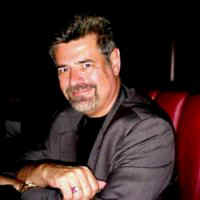![]()
 |
Raymond E. Feist is one of the true stars of the world of literary fantasy. In 1982, with the publication of his debut novel, Magician, Feist took the fantasy world by storm. Since that time, he has become one of the pre-eminent writers of epic fantasy, along with contemporaries Stephen Donaldson, David Eddings and Robert Jordan. With over 12 million copies of his books in print and translated into 15 languages, Feist has international appeal and success. His work appears regularly on best-seller lists including The New York Times and The Times of London. |
His first novel, Magician, has over one million books in print, and his Rage of a Demon King was an international bestseller landing many bestseller lists since its release in April 1997.
This best-selling author has established himself as a master of the fantasy genre through the magical and complex worlds he creates.
"I don't write fantasy; I write historical novels about an imaginary place. At least that's how I look at it," says Raymond E. Feist, who is a Southern Californian by birth and a San Diegan by choice. He was educated at the University of California, San Diego, where he took his B.A. in Communication Arts with Honors in 1977.
Two factors drew Feist to fantasy. One was the fact that "nobody writes adventure fiction any more -- what was called 'boys' adventure fiction' when I was growing up," he says. "I read Robert Louis Stevenson and Anthony Hope (Prisoner of Zenda), Alexandre Dumas (Three Musketeers). I also read historical novels by Costain, Renault, and Shellenbarger. The closest in the modern market to these is fantasy."
The second thing was that while attending the University of California, San Diego Feist got hooked into a fantasy role-playing group of grad students. Thus he could inhabit a ready-to-go environment. It was easy for him to drop his stories into that "real estate," he says, because it was an objective virtual world. "I didn't have to make decisions on world-building. I could just tell a story with an added level of verisimilitude. I could deal with issues, making it much like writing a historical novel. I wrote historical novels about another world."
His historical novels include the Serpentwar
and Riftwar sagas, the Empire Trilogy, Prince of the Blood, The King's
Buccaneer, Faerie Tale, a dark-fantasy set in America,
and many newer series, the The Riftwar Legacy, Legends
of the Riftwar, The Conlave of Shadows and the
Darkwar, Demonwar, and
Chaoswar sagas.
After he graduated from UCSD with a degree in communications arts, Feist worked in the health and human services field, until a tax "revolt" in California cut his funding. "When you're unemployed you have time on your hands," he laughs. "That's when I wrote Magician. After that, the rest is history, as they say."
Part of that history includes computer gaming. Feist's universe became
the setting for computer
games, such as the classic best selling RPG, Betrayal at Krondor.
Together with Sierra Studios and PyroTechnix, Feist more recently produced the cutting-edge
sequel to that game, entitled Return to Krondor. Set in
Feist's world of Midkemia, the player assumes the roles of various characters as they
embark on an epic role playing quest. Although computer games and fantasy novels can look similar on the surface, the two media demand different things of a story, Feist explains.
"There are lots of things in the computer games -- like some of the subquests -- that will never make it to the pages of
a book, because while they're good gaming, they're bad story-telling. Much of the dialog, entirely appropriate for the game environment, would look dumb on the page. And there's stuff I could write on the page that would look really underplayed and held back in the game. I learned early on that storytelling in computer games is bigger, more theatrical, more like doing melodrama than drama."
Since Feist has a huge readership, with his works translated into 15 languages, he tends to wonder at fantasy's attraction. "You start with the thesis that all fiction is fantasy," he begins, "none of it is real. I don't want to sound like Joseph Campbell here, but High Fantasy -- sword and sorcery, quests and dragons -- speaks to a fairly basic human astonishment at the universe. Humans are the only creatures that intentionally put ourselves in harm's way. Yet we often don't know what's out there. And when we don't we often make up an answer. Cynics might say that's the basis of all organized religion. Others say it's the underlying root of mythic structures. And on top of all this deep sounding stuff, fantasy is also a satisfying entertainment. You can go out and confront evil, vanquish the monsters. And put the book down and deal with the real nightmare in your life -- the IRS. Fantasy has been around since the epic of Gilgamesh. There's something about 'Let's pretend' that sings to the child in all of us."
Raymond E. Feist lives in San Diego, California. When not writing, Ray continues to design computer games, and other hobbies include collecting movies on laser disc, fine wine, and compiling a history of professional football in the US.
Raymond E. Feist's books are published by HarperCollins.
Praise for Raymond E. Feist:
"Classic...Feist has a natural talent for keeping the reader turning pages."
Chicago Sun-Times
"Action and intrigue and evocative writing...Feist brings a new world alive."
Portland Oregonian
"An epic reading experience."
San Diego Union-Tribune
"Feist remains honorably in the forefront of fantasists."
Booklist
"Just about everything a fantasy fan could ask for."
United Press International